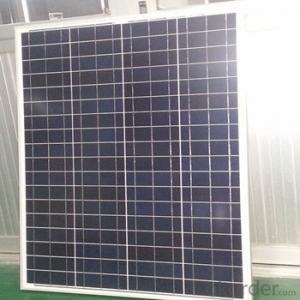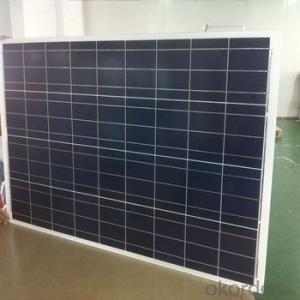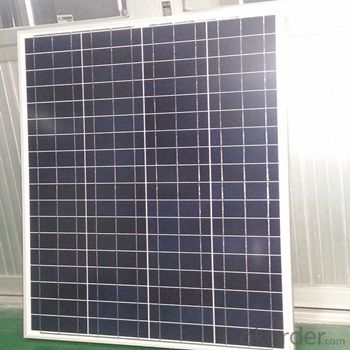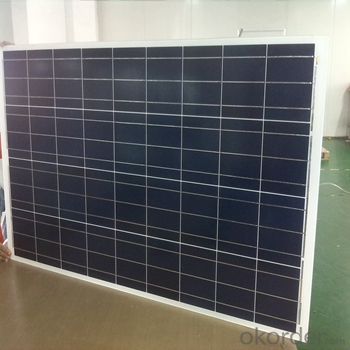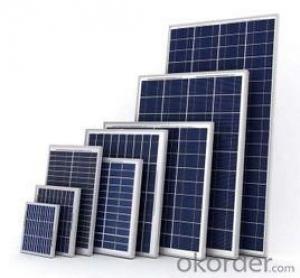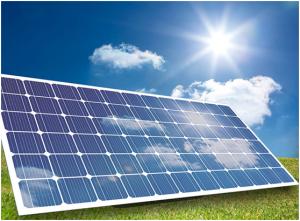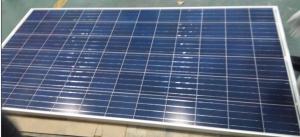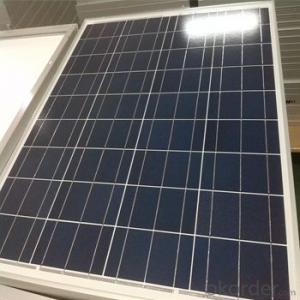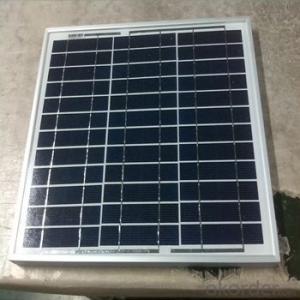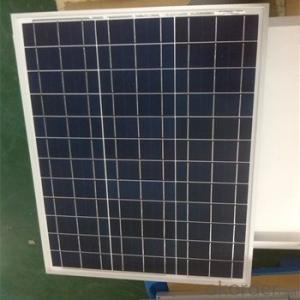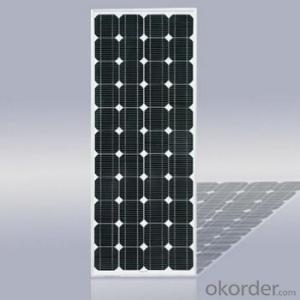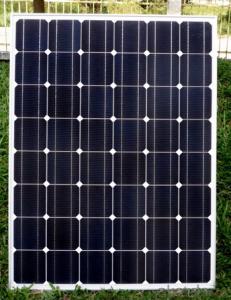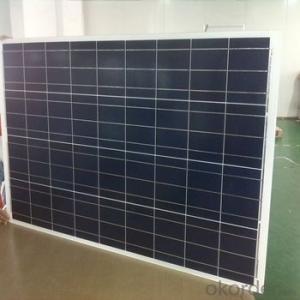Sunmac Solar Panels - Polycrystalline Solar Module 100W CNBM Series
- Loading Port:
- Shanghai
- Payment Terms:
- TT OR LC
- Min Order Qty:
- 25 pc
- Supply Capability:
- 20000 pc/month
OKorder Service Pledge
OKorder Financial Service
You Might Also Like
Polycrystalline Solar Module-100w CNBM Series
High efficiency crystalline solar cell. Even if under the weak light, the solar module can produce maximum power output.
II Tempered glass (toughened glass): Anti-reflecting coating and high transmission rate glass increase the power output and mechanical strength of solar module.
III EVA and TPT: Using high quality EVA and TPT to prevent destroying and water.
IV AI frame: Without screw, rner connection. 6 holes on the frame can be installed easily.
V Junction box: Multi function junction box with water proof.
VI Long lifetime: ≥25 years; Less power decrease.
VII Good performance of preventing from atrocious weather such as wind and hails.
VIII Resisting moisture and etching effectively, not effected by geology.
IX The certificate issued by international authority: UL, TUV, IEC, CE.
Standard Test Conditions of Polycrystalline Silicon Solar Panel
The opto-electrical specifications shown below are stabilized values being measured at Standard Test Conditions, Irradiance: 1000W/m2, Spectrum: AM1.5 at 25°C, The info below is subject to manufacturing tolerances. Where appropriate minutes of measurement are available and are used for the dimensioning of the installation.
Advantages of Monocrystalline Silicon Solar Panel
• CNBM Solar performance guarantees for 25 years
• 12 years guarantee for workmanship
• Timeliness of delivery
• Quality Products certified (TÜV, UL, CE, ISO)
Specification
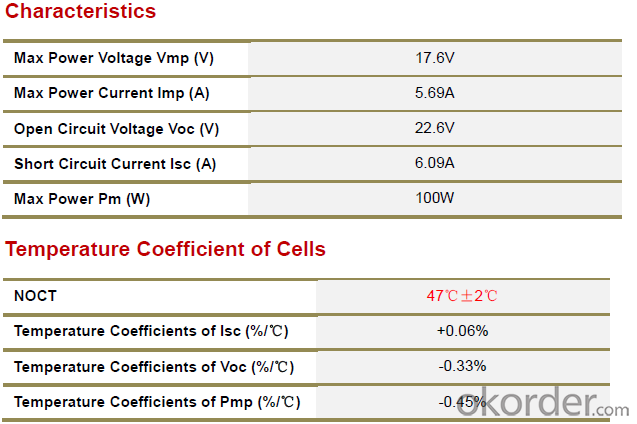
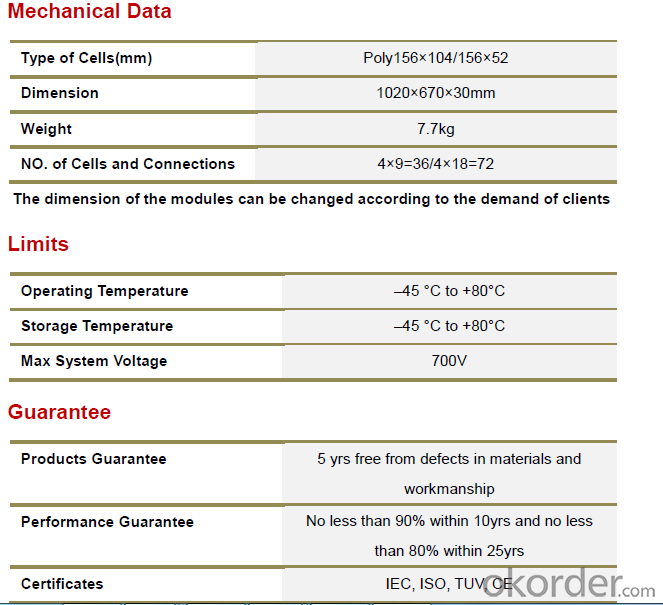
Certification
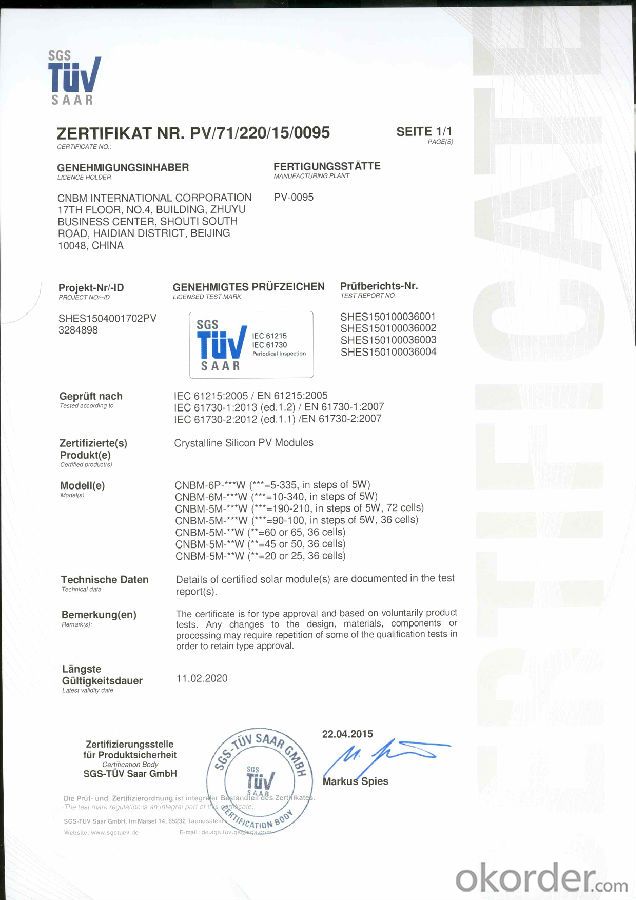
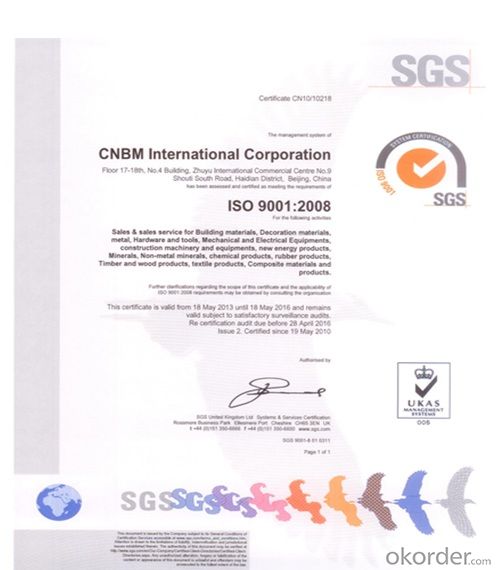
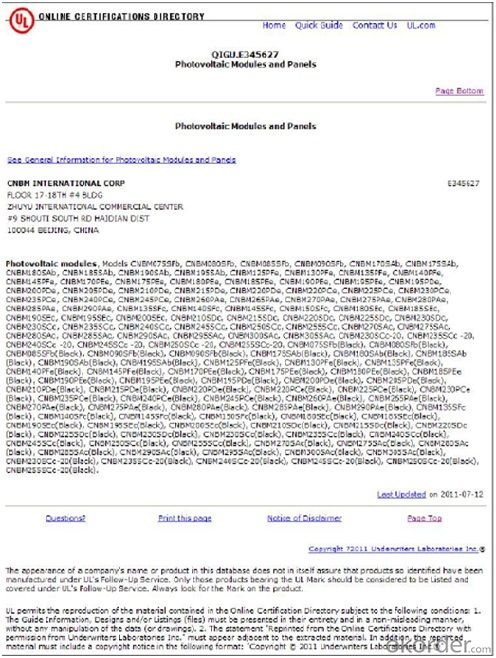
FAQ
We have organized several common questions for our clients,may help you sincerely:
①What price for each watt?
It depends on the quantity, delivery date and payment terms,
②What is your size for each module? Can you tell me the Parameter of your module?
We have different series of panels in different output, both c-Si and a-Si. Please take the specification sheet for your reference.
③Can you provide the peripheral products of the solar panels, such as the battery, controller, and inverter? If so, can you tell me how do they match each other?
Yes, we can, we have two companies for solar region, one is CNBM International, the other is CNBM engineering Co.
We can provide you not only the solar module but also the off grid solar system, we can also provide you service with on grid plant.
④What is your warranty system?
Our product performance guarantees for 25 years
• 12 years guarantee for workmanship
• Timeliness of delivery
• Quality Products certified (TÜV, UL, CE, ISO)
⑤How do you pack your products?
We have rich experience on how to pack the panels to make sure the safety on shipment when it arrives at the destination.
⑥ Can you do OEM for us?
Yes, we can.
⑦How long can we receive the product after purchase?
In the purchase of product within three working days, We will arrange the factory delivery as soon as possible. The pecific time of receiving is related to the state and position of customers.Commonly 7 to 10 working days can be served.
- Q: ) what is absolutely needed to hook up a solar panel to grid tie, what permits and/or inspectors are needed?2) if we know how many KWH's we use per month, do we just divide by number of hours per month to find out average KW usage?3) what is an estimated ratio of DC to AC transformation/convertion @ 30 C?4) do the solar panel voltages have to be the same? what would happen if the voltage going into the house is greater/lower than that of the house's defualt voltage5) for added chance of getting 0 pts add some contrators that do business in ohio for installing solar panels or sell them
- The okorder The reference section has all the formulas you are looking for and there is a list of dealers by state, plus various state rebate information. Yes, you can hook up different panels to the same system. There are special controllers that regulate the voltage. I'm more of a hands on nuts and bolts guy so I can't help you with the formulas and engineering explanations. Another great place to get information is Home Power Magazine. You can get the issues online or in print. Thanks for going solar!
- Q: can anyone help me? i was thinking of installing solar panels to cut bills but would it be a waste considering its gonna need a circulating pump running almost 24/7 (which will use electricity) and even still will only provide me with quot;warmwater? also would it be possible to install the solar panels for the sole purpose of providing sufficient power to run electric heaters instead of using gas/oil? this way allowing me to have a warm house without the expensive bills. brobably talking about running 7 heaters/electric radiators.
- A thermal solar panel to feed your water heater is the most efficient. But you need a classic heater system too when there is no or little sun. Solar panels to heat a home is not at all recommended. First of all, you get less day light and less sun in winter, so you won't get much electricity. They work best in summer, but electric panels have poor yields and are a very long term investment. You will need to wait years before saving money. Natural gas, a well isolated home, and a good old sweater is the best way to cut bills.
- Q: Can solar panels be used during a power outage?
- No, solar panels cannot be used during a power outage unless they are connected to a battery storage system.
- Q: Can solar panels be used in urban areas with limited space?
- Yes, solar panels can be used in urban areas with limited space. Advances in technology have made it possible to use smaller, more efficient solar panels that can be installed on rooftops, balconies, and even walls of buildings. Additionally, solar panels can be integrated into various structures like solar canopies, awnings, or vertical facades, making them suitable for urban areas with limited space.
- Q: Are there any safety concerns with solar panels?
- There are a few safety concerns associated with solar panels, but they are relatively minimal and manageable. The main concerns include the risk of electrical shock during installation or maintenance if proper precautions aren't followed, fire hazards due to faulty wiring or improper installation, and potential damage from extreme weather conditions. However, with proper installation, regular maintenance, and adherence to safety guidelines, these risks can be significantly mitigated, ensuring the safe use of solar panels.
- Q: I've built a set of lights, fan and a clock running on only solar power. The problem is, i have to present it tomorrow and when the light isn't particularly strong it won't work too well. It works flawlessly when its under my desk light on max brightness but the only the light works when i set it to low brightness. Currently, tomorrow in my city it won't be sunny so any advice for trying to make it work under low light?
- Solar panels are designed to be used to recharge a battery or series of batteries, not for direct power. That is the inherent weakness of solar systems. The only way to have it work in low light conditions if to have several cells wired in series and have a voltage regulator to limit the amount of voltage that can be supplied. Other than that, add a battery and a charging circuit that the cell would supply power to.
- Q: Can solar panels be used to power a swimming pool?
- Yes, solar panels can be used to power a swimming pool. Solar panels generate electricity from sunlight, which can be used to operate pool pumps, heaters, and other pool equipment. This helps reduce reliance on traditional energy sources and can result in cost savings.
- Q: I need to know how Solar panels work please help me!! Also, if you know any other additional important information about Solar Energy in General please tell me, Thanks.
- The most important parts of a solar cell are the semiconductor layers, this is where the electron current is created. There are a number of different materials available for making these semiconducting layers, and each has benefits and drawbacks. Unfortunately, there is no one ideal material for all types of cells and applications. In addition to the semiconducting materials, solar cells consist of a top metallic grid or other electrical contact to collect electrons from the semiconductor and transfer them to the external load, and a back contact layer to complete the electrical circuit. Then, on top of the complete cell is typically a glass cover or other type of transparent encapsulant to seal the cell and keep weather out, and a antireflective coating to keep the cell from reflecting the light back away from the cell. A typical solar cell consists of a cover glass, a anti-reflective layer, a front contact to allow the electrons to enter a circuit and a back contact to allow them to complete the circuit, and the semiconductor layers where the electrons begin to complete there voyages! The solar panels, in order to generate power, are using the method of screen-printing, a technique developed for printing fabrics, paper and to produce plastic, glass and metal solar cells. The basic materials of a photovoltaic cell (solar cell) are inexpensive. The homemade solar cells have about /4 of the efficiency of commercial silicon solar cells, which turn 0-20 per cent of light energy into electricity. But, being cheap to produce, they can make up the loss in quantity what they lack in quality.
- Q: Can solar panels be used to power swimming pools or hot tubs?
- Yes, solar panels can be used to power swimming pools or hot tubs. Solar panels capture sunlight and convert it into electricity, which can then be used to power various devices including pool pumps and heaters. This is an eco-friendly and cost-effective way to maintain the desired temperature in a swimming pool or hot tub.
Send your message to us
Sunmac Solar Panels - Polycrystalline Solar Module 100W CNBM Series
- Loading Port:
- Shanghai
- Payment Terms:
- TT OR LC
- Min Order Qty:
- 25 pc
- Supply Capability:
- 20000 pc/month
OKorder Service Pledge
OKorder Financial Service
Similar products
Hot products
Hot Searches
Related keywords
